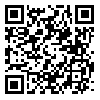Wed, Apr 17, 2024
| فارسی
Volume 6, Issue 1 And 2 (Spring & Summer 2004)
Advances in Cognitive Sciences 2004, 6(1 And 2): 51-58 |
Back to browse issues page
Download citation:
BibTeX | RIS | EndNote | Medlars | ProCite | Reference Manager | RefWorks
Send citation to:



BibTeX | RIS | EndNote | Medlars | ProCite | Reference Manager | RefWorks
Send citation to:
Najafi M, Mohammadi M, Tehranidoost M, Alaghbandrad J, Asaari S. Effects of Two Types of Computer Assisted Intervention on Spelling Scores of Primary School Children With Attention- Deficit/ Hyperactivity Disorder. Advances in Cognitive Sciences 2004; 6 (1 and 2) :51-58
URL: http://icssjournal.ir/article-1-34-en.html
URL: http://icssjournal.ir/article-1-34-en.html
Mostafa Najafi * 
 1, MohammadReza Mohammadi
1, MohammadReza Mohammadi 
 , Mahdi Tehranidoost
, Mahdi Tehranidoost 
 , Javad Alaghbandrad
, Javad Alaghbandrad 
 , Shervin Asaari
, Shervin Asaari 


 1, MohammadReza Mohammadi
1, MohammadReza Mohammadi 
 , Mahdi Tehranidoost
, Mahdi Tehranidoost 
 , Javad Alaghbandrad
, Javad Alaghbandrad 
 , Shervin Asaari
, Shervin Asaari 

Abstract: (2276 Views)
Objective: This study assessed the effects of computer games and computer assisted-typing instructions on spelling scores of primary school children with attention-deficit/hyperactivity disorder (ADHD).
Method: In this -single blind clinical trial, 37 primary school children with ADHD were. assigned to group 1.,(n=17) and group 2 (n=20). The children in group 1 played computer games in 8 one-hour sessions (three times a week), while the children in group 2 received 8 one-hour sessions of typing instructions (three times a week). Twelve school's spelling scores were obtained; pre-, intra-, and post-intervention, each four scores. Eight session's spelling scores were also recorded.
Results: The two groups were matched for age, school grade, gender, IQ, medications, parents' and teachers' Conner's score, having a personal computer at home, experience of working with the computer, and average spelling scores. After taking sessions of computer games, intra-intervention school's spelling scores (17.93±0.03) showed a significant borderline increase in comparison to the pre-intervention scores (17.25±3.26). The typing instructions sessions made no difference.
Conclusion: Improvement in the mean spelling scores of the primary school students with ADHD during sessions of computer games can be due to improvement of their attention. The interesting format of these games, fast feedback, absence of negative feedback, and their supporting the decision making in children can also explain this finding.
Method: In this -single blind clinical trial, 37 primary school children with ADHD were. assigned to group 1.,(n=17) and group 2 (n=20). The children in group 1 played computer games in 8 one-hour sessions (three times a week), while the children in group 2 received 8 one-hour sessions of typing instructions (three times a week). Twelve school's spelling scores were obtained; pre-, intra-, and post-intervention, each four scores. Eight session's spelling scores were also recorded.
Results: The two groups were matched for age, school grade, gender, IQ, medications, parents' and teachers' Conner's score, having a personal computer at home, experience of working with the computer, and average spelling scores. After taking sessions of computer games, intra-intervention school's spelling scores (17.93±0.03) showed a significant borderline increase in comparison to the pre-intervention scores (17.25±3.26). The typing instructions sessions made no difference.
Conclusion: Improvement in the mean spelling scores of the primary school students with ADHD during sessions of computer games can be due to improvement of their attention. The interesting format of these games, fast feedback, absence of negative feedback, and their supporting the decision making in children can also explain this finding.
Type of Study: Research |
Subject:
Special
Received: 2003/11/6 | Accepted: 2004/01/11 | Published: 2004/03/20
Received: 2003/11/6 | Accepted: 2004/01/11 | Published: 2004/03/20
Send email to the article author
| Rights and permissions | |
 |
This work is licensed under a Creative Commons Attribution-NonCommercial 4.0 International License. |

